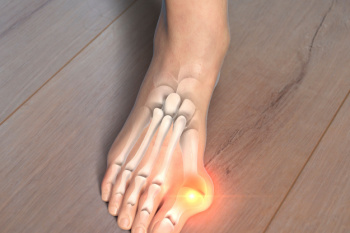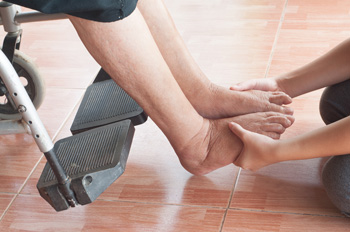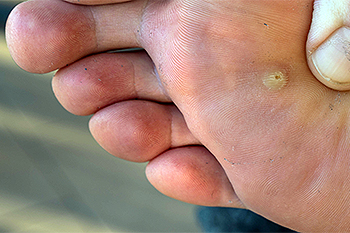Items filtered by date: May 2025
Symptoms a Fractured Ankle

A broken ankle can occur when one or more of the bones in the ankle joint, which include the tibia, fibula, or talus, cracks or breaks due to a fall, collision, or twisting injury. Symptoms of a broken ankle include sudden and intense pain, swelling, bruising, and difficulty in moving the ankle. In many cases, walking becomes impossible, although some people may still bear weight, despite a fracture. A loud snapping sound may be heard at the time of injury. In more severe cases, the ankle may appear misshapen or the broken bone may pierce the skin. A podiatrist can examine the ankle for signs of damage and order imaging tests, such as X-rays, to confirm a fracture. Treatment depends on the location and severity of the break and may involve immobilization with a cast or surgery to realign the bones. Early diagnosis and treatment are important to reduce long-term complications. If you believe you may have fractured an ankle bone, it is suggested that you make an emergency appointment with a podiatrist for an exam and appropriate treatment.
Broken ankles need immediate treatment. If you are seeking treatment, contact one of our podiatrists from Metro Foot & Ankle. Our doctors can provide the care you need to keep you pain-free and on your feet.
Broken Ankles
A broken ankle is experienced when a person fractures their tibia or fibula in the lower leg and ankle area. Both of these bones are attached at the bottom of the leg and combine to form what we know to be our ankle.
When a physician is referring to a break of the ankle, he or she is usually referring to a break in the area where the tibia and fibula are joined to create our ankle joint. Ankles are more prone to fractures because the ankle is an area that suffers a lot of pressure and stress. There are some obvious signs when a person experiences a fractured ankle, and the following symptoms may be present.
Symptoms of a Fractured Ankle
- Excessive pain when the area is touched or when any pressure is placed on the ankle
- Swelling around the area
- Bruising of the area
- Area appears to be deformed
If you suspect an ankle fracture, it is recommended to seek treatment as soon as possible. The sooner you have your podiatrist diagnose the fracture, the quicker you’ll be on the way towards recovery.
If you have any questions, please feel free to contact our office located in Tempe, AZ . We offer the newest diagnostic and treatment technologies for all your foot care needs.
When Is Bunion Surgery Necessary?

If you are struggling with daily pain from a bunion, you may wonder if having surgery is the right choice. A bunion is not just a bump on the side of the big toe. It develops when the joint at the base of the big toe shifts out of place as the tip pushes toward the other toes. This can lead to pressure, skin sores, and even affect the alignment of the second toe. Surgery is the only way to correct the position of the bones and relieve pressure caused by the bunion. A podiatrist may recommend one of several procedures, including cutting and repositioning the bones, or fusing parts of the foot to stabilize the joint. The main benefit of bunion surgery is long-term relief from pain and improved foot function. However, recovery can take weeks. Risks include swelling, stiffness, and rare complications like infection or nerve irritation. If you have a painful bunion, it is suggested that you schedule an appointment with a podiatrist to find out if surgery is the right option for you.
If you are suffering from bunion pain, contact one of our podiatrists of Metro Foot & Ankle. Our doctors can provide the care you need to keep you pain-free and on your feet.
What Is a Bunion?
Bunions are painful bony bumps that usually develop on the inside of the foot at the joint of the big toe. As the deformity increases over time, it may become painful to walk and wear shoes. Women are more likely to exacerbate existing bunions since they often wear tight, narrow shoes that shift their toes together. Bunion pain can be relieved by wearing wider shoes with enough room for the toes.
Causes
- Genetics – some people inherit feet that are more prone to bunion development
- Inflammatory Conditions - rheumatoid arthritis and polio may cause bunion development
Symptoms
- Redness and inflammation
- Pain and tenderness
- Callus or corns on the bump
- Restricted motion in the big toe
In order to diagnose your bunion, your podiatrist may ask about your medical history, symptoms, and general health. Your doctor might also order an x-ray to take a closer look at your feet. Nonsurgical treatment options include orthotics, padding, icing, changes in footwear, and medication. If nonsurgical treatments don’t alleviate your bunion pain, surgery may be necessary.
If you have any questions, please feel free to contact our office located in Tempe, AZ . We offer the newest diagnostic and treatment technologies for all your foot care needs.
Foot Pain and Posture Linked to Falls in Older Adults

Older adults with foot pain may face more than just daily discomfort. They may also be at greater risk of falling. Research shows that those with ongoing or intense foot pain are more likely to experience repeated falls. The structure of the foot also matters. A flat foot shape, known as planus posture, may affect balance and stability, further raising the risk. These two factors often work together, making it harder for the body to respond quickly during movement. Wearing proper footwear, doing targeted exercises, and getting podiatric care can help reduce the chance of falling. Addressing foot pain early and supporting healthy foot alignment can protect both mobility and safety. If foot problems are making it harder to stay steady, it is suggested you see a podiatrist for diagnosis and appropriate treatment.
Proper foot care is something many older adults forget to consider. If you have any concerns about your feet and ankles, contact one of our podiatrists from Metro Foot & Ankle. Our doctors can provide the care you need to keep you pain-free and on your feet.
The Elderly and Their Feet
As we age we start to notice many changes in our body, but the elder population may not notice them right away. Medical conditions may prevent the elderly to take notice of their foot health right away. Poor vision is a lead contributor to not taking action for the elderly.
Common Conditions
- Neuropathy – can reduce feeling in the feet and can hide many life-threatening medical conditions.
- Reduced flexibility – prevents the ability of proper toenail trimming, and foot cleaning. If left untreated, it may lead to further medical issues.
- Foot sores – amongst the older population can be serious before they are discovered. Some of the problematic conditions they may face are:
- Gouging toenails affecting nearby toe
- Shoes that don’t fit properly
- Pressure sores
- Loss of circulation in legs & feet
- Edema & swelling of feet and ankles
Susceptible Infections
Diabetes and poor circulation can cause general loss of sensitivity over the years, turning a simple cut into a serious issue.
If you have any questions, please feel free to contact our office located in Tempe, AZ . We offer the newest diagnostic and treatment technologies for all your foot care needs.
Causes and Types of Plantar Warts

Plantar warts are non-cancerous growths that develop on the soles of the feet, caused by a viral infection from the human papillomavirus, or HPV. The virus enters the skin through small cuts or abrasions and results in the formation of hard, rough patches. There are two main types of plantar warts, solitary and mosaic. Solitary warts appear as single, raised lesions that can cause pain when walking or standing, while mosaic warts are clusters of smaller warts grouped together. Symptoms include pain, discomfort, and the appearance of a thickened, calloused area on the skin. The warts may also have tiny black dots, which are small blood vessels that have clotted. Plantar warts are contagious and can be spread through direct contact or shared surfaces, such as public pool areas. They can be painful and it may be difficult to complete daily activities. If you have developed this foot condition, it is suggested that you promptly contact a podiatrist who can offer effective treatment options.
Plantar warts can be very uncomfortable. If you need your feet checked, contact one of our podiatrists from Metro Foot & Ankle. Our doctors will assist you with all of your foot and ankle needs.
About Plantar Warts
Plantar warts are the result of HPV, or human papillomavirus, getting into open wounds on the feet. They are mostly found on the heels or balls of the feet.
While plantar warts are generally harmless, those experiencing excessive pain or those suffering from diabetes or a compromised immune system require immediate medical care. Plantar warts are easily diagnosed, usually through scraping off a bit of rough skin or by getting a biopsy.
Symptoms
- Lesions on the bottom of your feet, usually rough and grainy
- Hard or thick callused spots
- Wart seeds, which are small clotted blood vessels that look like little black spots
- Pain, discomfort, or tenderness of your feet when walking or standing
Treatment
- Freezing
- Electric tool removal
- Laser Treatment
- Topical Creams (prescription only)
- Over-the-counter medications
To help prevent developing plantar warts, avoid walking barefoot over abrasive surfaces that can cause cuts or wounds for HPV to get into. Avoiding direct contact with other warts, as well as not picking or rubbing existing warts, can help prevent the further spread of plantar warts. However, if you think you have developed plantar warts, speak to your podiatrist. He or she can diagnose the warts on your feet and recommend the appropriate treatment options.
If you have any questions, please feel free to contact our office located in Tempe, AZ . We offer the newest diagnostic and treatment technologies for all your foot care needs.
